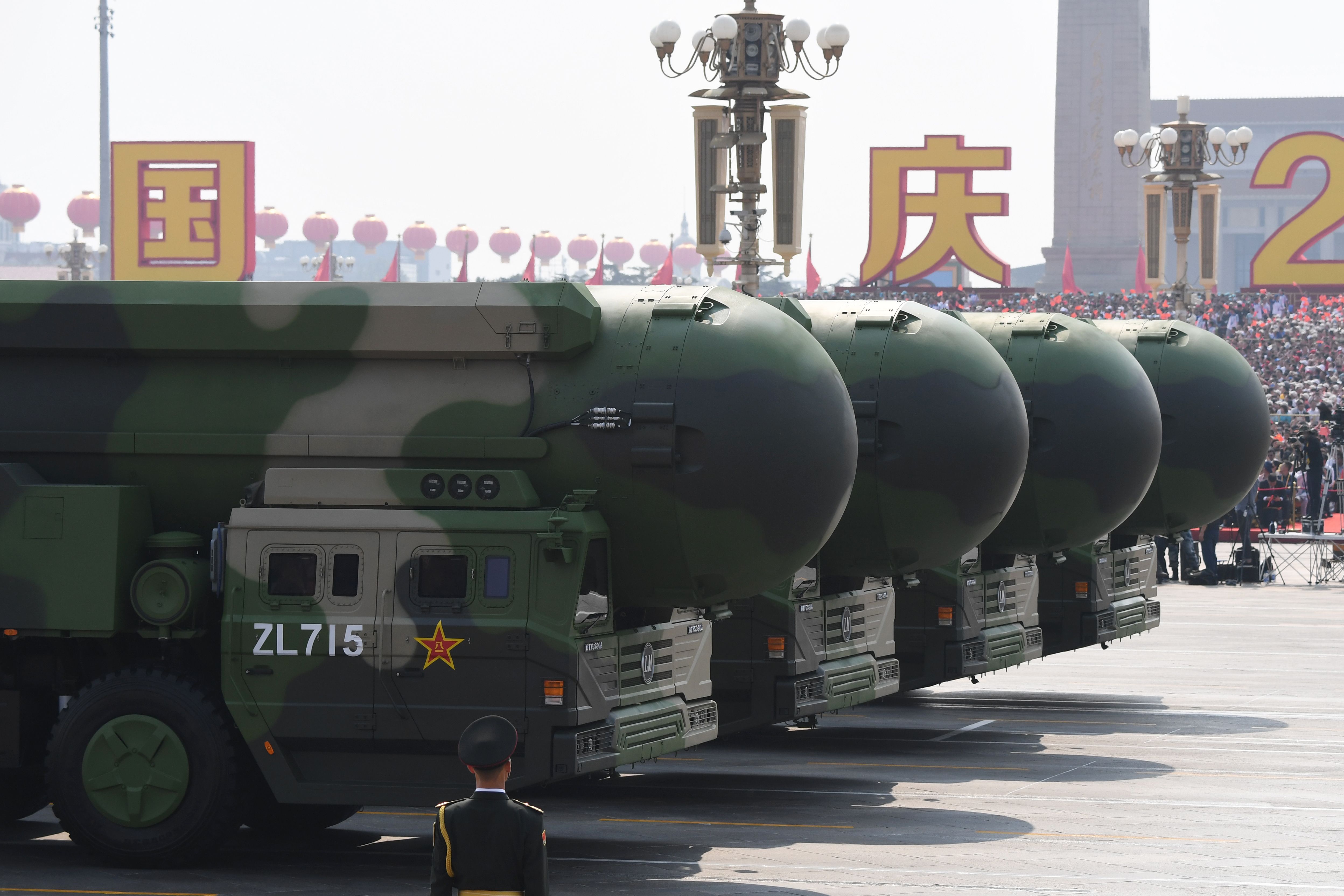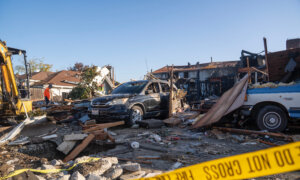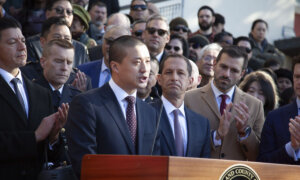Former Assistant Deputy Secretary of Defense Gloria Duffy said the United States will soon face a double nuclear threat from Russia and China and needs to be able to deter both countries at the same time.
Duffy spoke on a recent episode of EpochTV’s “Bay Area Innovators” program about the findings of the Congressional Commission on the Strategic Posture of the United States, in which she served as one of 12 members.
She said the commission was established for the fiscal year 2022 by congressional legislation called the National Defense Authorization Act, with the idea that the United States needs to take a look at the threats facing it from other countries on a strategic level.
“So that means nuclear threats and other major military threats, and look at our own strategic posture, our weapons, our doctrines for use of the weapons; how well do they stack up?” she said.
She said she was aware that China was adding to its nuclear arsenal significantly, as publicly available aerial photographs showed the digging of many new missile silos on Chinese territory. However, after hearing details in classified briefings while serving on the commission, she became more concerned.
“China has been a country with a small number of nuclear weapons, but they are rapidly building up to the same level as the U.S. and Russia, so that we would need to deter both countries at the same time,” she said. “Which presents a challenge for us in terms of whether to add to our arsenal of nuclear weapons, improve them, target them differently, or use other methods like defending our territory better or employing other methods to make sure that we are not at risk.”
The commission’s final report states that at China’s current pace, it will be on par with the United States in deployed nuclear warheads by the mid-2030s.
The report also states that by the 2030s, China’s conventional military build-up could turn the military balance in Asia against the United States and its allies.
Duffy said there were six Republicans and six Democrats on the commission, making it a bipartisan effort in which they came to a consensus.
“It is so important for us to be unified as a country, especially when it comes to our defense,” she said.
She said the collaboration between Russia and China presents a threat to the United States and that the two leaders, Xi Jinping and Vladimir Putin, are similar in the sense of being authoritarians and very much resenting the leadership provided by the United States and NATO and other Asian countries, including Japan and South Korea.
“They would like to replace us as world leaders,” she said.
The commission’s report concluded that dismissing the possibility of simultaneous two-peer aggression because it may seem improbable, and not addressing it with strategy, could have the effect of making such aggression more likely.
The commission’s report also states that China and Russia may think that the United States and its allies probably won’t use enough forces to oppose their regional aggression, since doing so may leave the United States and its allies vulnerable in another location. Russia and China may decide to take their chances, thinking they can win because their perceived stakes are higher and because of U.S. limitations.
The report also concludes that even though Russian conventional forces are inferior to fully mobilized NATO forces, Russia has an advantage over NATO states that are near it because it might be able to occupy such states’ territory before NATO forces can fully mobilize to defend them.
She said the commission’s final report was mainly intended to alert our country, especially our Congress, about the need to fund and push ahead programs required to ensure U.S. security.
The public report was released late last year and the commission recently finalized its classified annex report.
Duffy said that one of the things the commission found is that the lack of agreement on a budget, with the continuing resolutions in place of a budget, is harmful when it comes to defense.
“Our defense budget is approved two or three months at a time. We don’t really have an ongoing defense budget. This way of doing business is very dangerous for the U.S.,” she said.
She said the commission felt that the U.S. program of refurbishing and updating its nuclear weapons, submarines, bombers, and missiles is lagging and needs to move more quickly.
The commission’s final report recommends that the United States fully and urgently execute nuclear modernization, which includes the replacement of all U.S. nuclear delivery systems; modernization of its warheads; comprehensive modernization of U.S. nuclear command, control, and communications; and recapitalizing the nuclear enterprise infrastructure at the Department of Defense and the National Nuclear Security Administration.
The report states that the forces the United States needs to fight in Europe are different from those they need for Asia and that current planned forces cannot fully reinforce both potential locations at the same time because adversaries have non-nuclear means to hinder U.S. attempts to send forces to Asia or Europe.
According to the report, the United States needs to make decisions now to be prepared to address the threats that could arise from China and Russia in the next decade or so.
Duffy said a security clearance was needed to serve on the commission, meaning you had to be a former defense official because it involved classified briefings from various intelligence agencies.
She said the commission visited Los Alamos, where the U.S. nuclear arsenal is maintained, as well as the Strategic Air Command in Omaha and other military commands.
She said that one of the main strategies the United States needs to maintain is to be strong enough to cause a deterrent.
“What we mostly want to make sure is that no country feels like they could perpetrate an attack on the U.S. that we couldn’t respond to strongly enough, to make it unprofitable for them to do it in the first place,” she said. “So we need what’s called a secure second strike capability; that means our ability to strike back so strongly, even after their attack, that we would decimate their forces and their country.”
She said the United States doesn’t want a country to be in a position to threaten it so it wouldn’t take steps it feels are right. She pointed to the United States helping to defend Ukraine.
The commission report states that Russia’s use of large-scale military force against Ukraine demonstrates a willingness to take risks and tolerate significant loss. The outcome of the war in Ukraine could contribute to miscalculations about the risks and benefits of aggression.
Duffy said the United States would want to be able to take the steps it feels are needed to help prevent China from taking action against Taiwan.
The report states that China may think the cost of inaction against Taiwan is higher than the cost of conflict with the United States, and it may even risk nuclear war.
Additionally, the report outlines threats from North Korea, saying it’s on pace to deploy enough missiles to potentially challenge U.S. defenses. It states that North Korea’s chemical and biological weapons programs are very concerning and that its cyber forces have matured and are capable of achieving a diverse array of strategic objectives.
Duffy said the reason a country such as North Korea could cause a threat is because it starves its people to put whatever is available into the military and because it gets help from its allies.
The report states that Iran will maintain a nuclear program to enhance its security, prestige, and regional influence and that in a few years, it could field advanced longer-range missile systems.
In the early 1990s, Duffy was involved with the governmental team and U.S. allies who negotiated with the countries of Russia, Ukraine, Belarus, and Kazakhstan after the dissolution of the Soviet Union. The team and allies managed to eliminate 7,000 nuclear weapons in those countries. They also helped to get the commitment of Ukraine, Belarus, and Kazakhstan to become non-nuclear and to have weapons scientists work on civilian projects so they wouldn’t go to other countries and help them make nuclear weapons.
While Russia was entitled to keep weapons, Duffy helped with programs to get Russia to better protect the weapons on its territory, dismantle some of its weapons, and dismantle the weapons coming back to Moscow from other countries.
She said the program to help do that was created by the U.S. Congress and was called the Nunn-Lugar Act, or the Cooperative Threat Reduction Act, in which the U.S. Department of Defense was allowed to take $400 million a year and work with those countries to get rid of their weapons of mass destruction.














